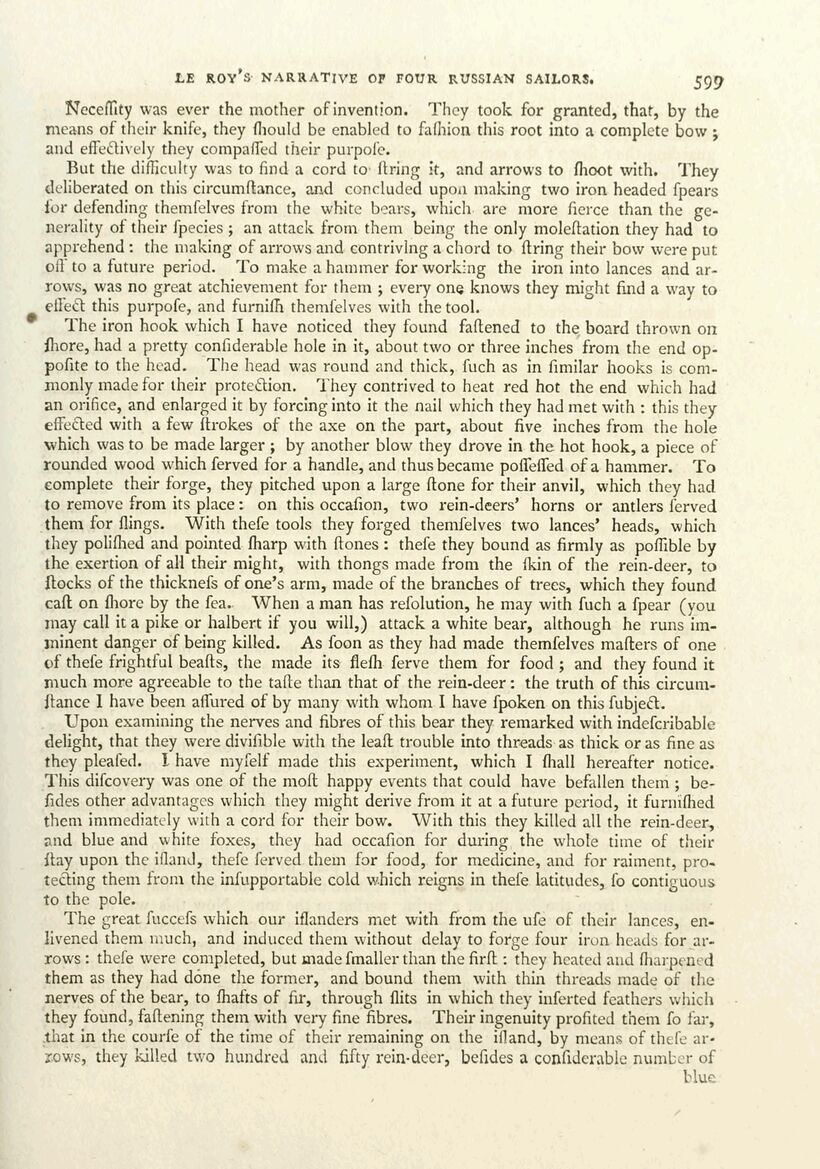
Full resolution (JPEG) - On this page / på denna sida - Pages ...

<< prev. page << föreg. sida << >> nästa sida >> next page >>
Below is the raw OCR text
from the above scanned image.
Do you see an error? Proofread the page now!
Här nedan syns maskintolkade texten från faksimilbilden ovan.
Ser du något fel? Korrekturläs sidan nu!
This page has never been proofread. / Denna sida har aldrig korrekturlästs.
LE ROY’S NARRATIVE OF FOUR RUSSIAN SAILORS 599
Neceflity was ever the mother ofinvention. They took for granted, that, by the
means of their knife, they fhould be enabled to fafhion this root into a complete bow ;
and effectively they compaffed their purpofe.
But the difficulty was to find a cord to {tring it, and arrows to fhoot with. They
deliberated on this circumftance, and concluded upon making two iron headed {pears
for defending themfelves from the white bears, which. are more fierce than the ge-
nerality of their fpecies ; an attack from them being the only moleftation they had to
apprehend: the making of arrows and contriving a chord to {tring their bow were put
off to a future period. To make ahammer for working the iron into lances and ar-
rows, was No great atchievement for them ; every ong knows they might find a way to
effect this purpofe, and furnifh themfelves with the tool.
The iron hook which I have noticed they found faftened to the board thrown on
fhore, had a pretty confiderable hole in it, about two or three inches from the end op-
pofite to the head. The head was round and thick, fuch as in fimilar hooks is com-
monly made for their protection, ‘They contrived to heat red hot the end which had
an orifice, and enlarged it by forcing into it the nail which they had met with : this they
effected with a few ftrokes of the axe on the part, about five inches from the hole
which was to be made larger ; by another blow they drove in the hot hook, a piece of
rounded wood which ferved for a handle, and thus became poflefled of a hammer. To
complete their forge, they pitched upon a large ftone for their anvil, which they had
to remove from its place: on this occafion, two rein-deers’ horns or antlers ferved
them for flings. With thefe tools they forged themfelves two lances’ heads, which
they polifhed and pointed fharp with ftones: thefe they bound as firmly as poffible by
the exertion of all their might, with thongs made from the {kin of the rein-deer, to
ftocks of the thicknefs of one’s arm, made of the branches of trees, which they found
caft on fhore by the fea. When a man has refolution, he may with fuch a fpear (you
may call ita pike or halbert if you will,) attack a white bear, although he runs im-
minent danger of being killed. As foon as they had made themfelves mafters of one
of thefe frightful beafts, the made its flefh ferve them for food; and they found it
much more agreeable to the tafte than that of the rein-deer: the truth of this circum-
{tance I have been aflured of by many with whom I have fpoken on this fubject.
Upon examining the nerves and fibres of this bear they remarked with indefcribable
delight, that they were divifible with the leaft trouble into threads:as thick or as fine as
they pleafed. Ihave myfelf made this experiment, which I fhall hereafter notice.
This difcovery was one of the moft happy events that could have befallen them ; be-
fides other advantages which they might derive from it at a future period, it furnifhed
them immediately with a cord for their bow. With this they killed all the rein-deer,
and blue and white foxes, they had occafion for during the whole time of their
{tay upon the ifland, thefe ferved them for food, for medicine, and for raiment, pro-
tecting them from the infupportable cold which reigns in thefe latitudes, fo contiguous
to the pole.
The great fuccefs which our iflanders met with from the ufe of their lances, en-
livened them much, and induced them without delay to forge four iron heads for ar-
rows: thefe were completed, but made fmaller than the firft : they heated and fharpened
them as they had done the former, and bound them with thin threads made of the
nerves of the bear, to fhafts of fir, through flits in which they inferted feathers which
they found, faftening them with very fine fibres. Their ingenuity profited them fo far,
that in the courfe of the time of their remaining on the iland, by means of thefe ar-
rows, they killed two hundred and fifty rein-deer, befides a confiderable RRS Sh
blue
<< prev. page << föreg. sida << >> nästa sida >> next page >>